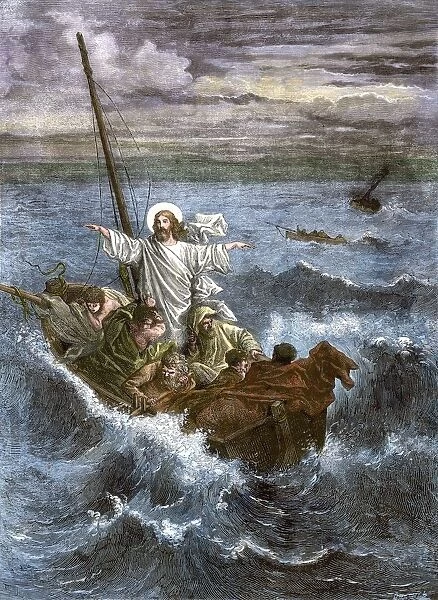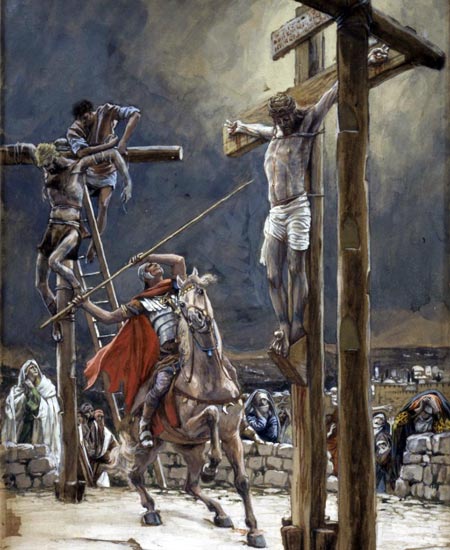“Pontius Pilate” was merely a historicization of the original Greek “πόντος πιλητὸς” (dense sea)
- Joseph D. L.
- Posts: 1428
- Joined: Sat Nov 11, 2017 2:10 am
Re: “Pontius Pilate” was merely a historicization of the original Greek “πόντος πιλητὸς” (dense sea)
I can fully appreciate that Pontus Pilate was used for more allegorical symbolism for the Gospel(s) writer(s). His historicity is simply a convenient utility as well.
- Joseph D. L.
- Posts: 1428
- Joined: Sat Nov 11, 2017 2:10 am
Re: “Pontius Pilate” was merely a historicization of the original Greek “πόντος πιλητὸς” (dense sea)
If I may self indulge a little bit, Pontius Pilate serves a functionary role in the Christian cycle. Is he historical? Yes, without question; but then what else would his purpose be if he was only used as a means of pinning Jesus's own historicity (which may or may not have been in question when the Gospels were composed)? To answer that question with another question, why do we assume that the writers of the Gospels had this or that idea in mind when they wrote? Because that is how we would write things, right? Are we not doing exactly what diviners and ecclesiastical professionals do? Look for patterns of meaning and extrapolate from it the truth.
But look closely. Pilate is there because there is a literary reason for it, not necessarily a historical reason. If the Gospel books were written with the historicity of Jesus already taken for granted then issues must be raised with Pilate being a figure of worth in the cycle since Marcion, Luke and Matthew open roughly with their unique terminus ante quems that set the temporal frame. "Well, that's because Pilate is used to bookend the historical life of Christ" would be an appropriate reply, but that would be incorrect as Pilate, much like Herod and Caiaphas take on dress roles, so their involvement cannot be merely to create a historical epic like The Silver Chalice--great book, btw--but a historical drama of sorts, or historical tragedy even. In that way and that way alone do figures like Quirinus, Herod, Caiaphas, and Pilate become purely story actors, used to fulfill the function that the writers had in mind for them. And is it much of a wonder that Herod and Pontius (sea) Pilate find prefigurations in Revelation?



But look closely. Pilate is there because there is a literary reason for it, not necessarily a historical reason. If the Gospel books were written with the historicity of Jesus already taken for granted then issues must be raised with Pilate being a figure of worth in the cycle since Marcion, Luke and Matthew open roughly with their unique terminus ante quems that set the temporal frame. "Well, that's because Pilate is used to bookend the historical life of Christ" would be an appropriate reply, but that would be incorrect as Pilate, much like Herod and Caiaphas take on dress roles, so their involvement cannot be merely to create a historical epic like The Silver Chalice--great book, btw--but a historical drama of sorts, or historical tragedy even. In that way and that way alone do figures like Quirinus, Herod, Caiaphas, and Pilate become purely story actors, used to fulfill the function that the writers had in mind for them. And is it much of a wonder that Herod and Pontius (sea) Pilate find prefigurations in Revelation?


Re: “Pontius Pilate” was merely a historicization of the original Greek “πόντος πιλητὸς” (dense sea)
At the present, I think that the Gospel chronology is ultimately dictated by John the Baptist (Josephus mentioning really him in Antiquities 18), with Pilate being added shortly after (via PLT) to give (ironical) identity to an otherwise anonymous Roman Governor.Joseph D. L. wrote: ↑Sun Mar 31, 2024 9:32 pm
But look closely. Pilate is there because there is a literary reason for it, not necessarily a historical reason.
But the principal reason was the choice of the Baptizer as the chronological marker of an entire age by his baptism (baptism that is also the reason for the his label), beyond if imparted to Jesus in the first gospel or not.
Celsus is a good source on this point, in a passage that is probably the his more interesting contribution to the topic:
When you were bathing, says the Jew, beside John, you say that what had the appearance of a bird from the air alighted upon you. And then this same Jew of his, continuing his interrogations, asks, What credible witness beheld this appearance? Or who heard a voice from heaven declaring you to be the Son of God? What proof is there of it, save your own assertion, and the statement of another of those individuals who have been punished along with you?
http://www.newadvent.org/fathers/04161.htm
Credit also to Bruno Bauer to point out the same thing pointed out by Celsus.
- Peter Kirby
- Site Admin
- Posts: 8629
- Joined: Fri Oct 04, 2013 2:13 pm
- Location: Santa Clara
- Contact:
Re: “Pontius Pilate” was merely a historicization of the original Greek “πόντος πιλητὸς” (dense sea)
This makes sense IMO. Thank you for suggesting it.
I think it's a stronger hypothesis when stated this way, i.e., that the chronology was selected to bring things in proximity to John the Baptist. This genuinely helps to explain the chronology selected.
IMO attempting to introduce multiple explanations all converging on the same timeline weakens the hypothesis both (a) in the simple Carrier-style probability sense that "A" will always be more probable than "A & B" and (b) because some of the additional hypotheses are determined by features that the Gospel writer had little discretion over, and the range of selection of governors of Judea rapidly narrows to a short list of actual names, so the selection of an actual name becomes a difficulty unless that was essentially the sole reason (just "B") for the selection. The most parsimonious explanation is that "A" is sufficient (e.g. the John the Baptist chronology) and that "B" (e.g. the name of the prefect) may not have been truly significant.
A comparison with the Toledoth Yeshu can perhaps help a bit here in explaining this point. In that text, a name that is not appropriate to the alleged time period - Queen Helene - is used in the story of Jesus. This may be connected to the 4th century mother of Constantine. The author has selected the name presumably for a reason other than it being the right name for the given place and time. So the most parsimonious explanation there is that it wasn't selected as a name for the time and place (but for another reason).
Feel free to ignore this criticism and analysis. I think it offers a way to improve the probability of the explanation offered, but I know that others may think differently.
I do appreciate the fact that you're carefully considering the John the Baptist passage. That's good. If you keep this up, I will have to say more good things about your contributions on these topics. I would like to, and I will read with interest to see.
Re: “Pontius Pilate” was merely a historicization of the original Greek “πόντος πιλητὸς” (dense sea)
I agree. JtB is the most important character in the stories (besides IC of course), the rest are just background.
If the Gospel writers got JtB from Josephus then we have a better understanding of how early they were writing.
If the Gospel writers got JtB from Josephus then we have a better understanding of how early they were writing.
- maryhelena
- Posts: 2964
- Joined: Tue Oct 08, 2013 11:22 pm
- Location: England
Re: “Pontius Pilate” was merely a historicization of the original Greek “πόντος πιλητὸς” (dense sea)
Not to forget the Slavonic Josephus JtB story in the time of Archelaus 4 b.c. to 6 c.e. Hence no need for gospel writers to wait upon Antiquities for the JtB story...
https://sacred-texts.com/chr/gno/gjb/gjb-3.htm
Re: “Pontius Pilate” was merely a historicization of the original Greek “πόντος πιλητὸς” (dense sea)
That was an interesting read Mary, thanks for that.maryhelena wrote: ↑Tue Apr 02, 2024 1:26 amNot to forget the Slavonic Josephus JtB story in the time of Archelaus 4 b.c. to 6 c.e. Hence no need for gospel writers to wait upon Antiquities for the JtB story...
https://sacred-texts.com/chr/gno/gjb/gjb-3.htm
Re: “Pontius Pilate” was merely a historicization of the original Greek “πόντος πιλητὸς” (dense sea)
^ Can't help but notice that the wonder-doer isn't named in that text.
Interesting.
Interesting.
- maryhelena
- Posts: 2964
- Joined: Tue Oct 08, 2013 11:22 pm
- Location: England
- Peter Kirby
- Site Admin
- Posts: 8629
- Joined: Fri Oct 04, 2013 2:13 pm
- Location: Santa Clara
- Contact:
Re: “Pontius Pilate” was merely a historicization of the original Greek “πόντος πιλητὸς” (dense sea)
When was the Slavonic Josephus JtB story written?maryhelena wrote: ↑Tue Apr 02, 2024 1:26 amNot to forget the Slavonic Josephus JtB story in the time of Archelaus 4 b.c. to 6 c.e. Hence no need for gospel writers to wait upon Antiquities for the JtB story...
https://sacred-texts.com/chr/gno/gjb/gjb-3.htm